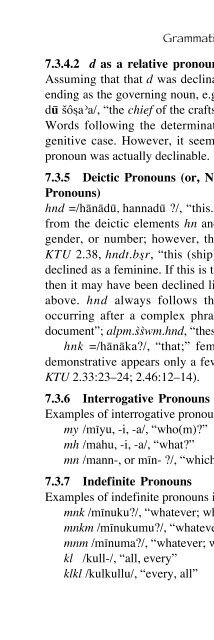A Primer on Ugaritic: Language, Culture, and Literature - enenuru
A Primer on Ugaritic: Language, Culture, and Literature - enenuru
A Primer on Ugaritic: Language, Culture, and Literature - enenuru
Create successful ePaper yourself
Turn your PDF publications into a flip-book with our unique Google optimized e-Paper software.
Grammatical Précis 157<br />
7.3.4.2 d as a relative pr<strong>on</strong>oun, i.e., “the <strong>on</strong>e who.”<br />
Assuming that that d was declinable, it should take the same case<br />
ending as the governing noun, e.g., rb.hrsûm/d.sûsa /rabbu harraœsûˆäma<br />
duœ sûo®sa}a/, “the chief of the craftsmen who (nom. sing.) produced.”<br />
Words following the determinative pr<strong>on</strong>oun are declined in the<br />
genitive case. However, it seems quite unlikely that the relative<br />
pr<strong>on</strong>oun was actually declinable.<br />
7.3.5 Deictic Pr<strong>on</strong>ouns (or, Near <strong>and</strong> Distant Dem<strong>on</strong>strative<br />
Pr<strong>on</strong>ouns)<br />
hnd =/haœnaœduœ, hannaduœ ?/, “this.” The near dem<strong>on</strong>strative derives<br />
from the deictic elements hn <strong>and</strong> d. Itisnot declinable for case,<br />
gender, or number; however, there is <strong>on</strong>e apparent excepti<strong>on</strong> in<br />
KTU 2.38, hndt.bsr, “this (ship) is in Tyre,” which seems to be<br />
declined as a feminine. If this is the combinati<strong>on</strong> of hn + relative d,<br />
then it may have been declined like the relative pr<strong>on</strong>oun discussed<br />
above. hnd always follows the noun it modifies, sometimes<br />
occurring after a complex phrase: e.g., spr.mlk.hnd, “this royal<br />
document”; alpm.sìsìwm.hnd, “these two thous<strong>and</strong> horses.”<br />
hnk =/haœnaœka?/, “that;” fem. hnkt /haœnaœkat- ?/. The distant<br />
dem<strong>on</strong>strative appears <strong>on</strong>ly a few times in difficult c<strong>on</strong>texts (e.g.,<br />
KTU 2.33:23–24; 2.46:12–14).<br />
7.3.6 Interrogative Pr<strong>on</strong>ouns<br />
Examples of interrogative pr<strong>on</strong>ouns include the following:<br />
my /mˆäyu, -i, -a/, “who(m)?”<br />
mh /mahu, -i, -a/, “what?”<br />
mn /mann-, or mˆän- ?/, “which?”<br />
7.3.7 Indefinite Pr<strong>on</strong>ouns<br />
Examples of indefinite pr<strong>on</strong>ouns include the following:<br />
mnk /mˆänuku?/, “whatever; whoever, any<strong>on</strong>e; whichever”<br />
mnkm /mˆänukumu?/, “whatever; whoever, any<strong>on</strong>e; whichever”<br />
mnm /mˆänuma?/, “whatever; whoever, any<strong>on</strong>e; whichever”<br />
kl /kull-/, “all, every”<br />
klkl /kulkullu/, “every, all”


